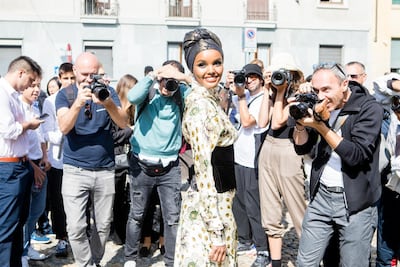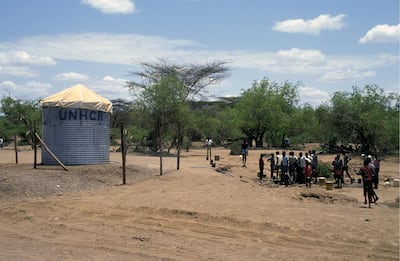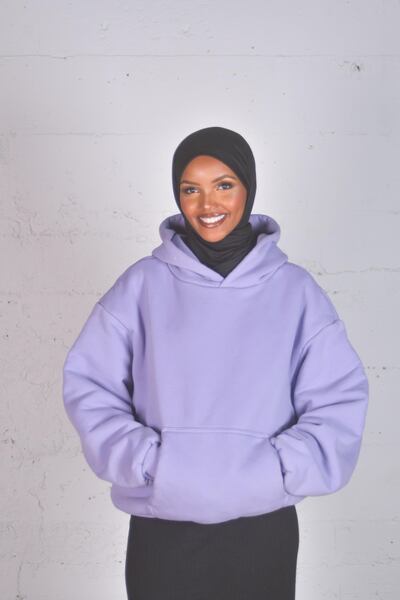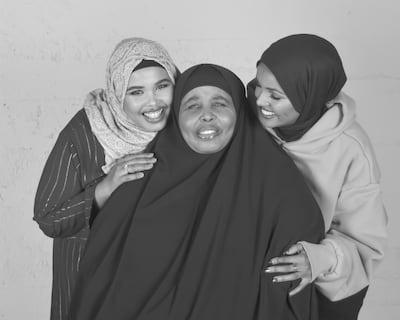Born in a refugee camp in Kenya, Halima Aden found fame as the world's first hijab-wearing model. And then, in November, she made the shock announcement that she would be quitting the fashion industry, claiming that she could no longer align her career path with her faith. "I don't regret my career, there were so many positive things I was able to accomplish, but I am so excited to take a step back and do things differently," Aden tells The National.
The paradox of modest fashion
At the start of her career at age 19, Aden incorporated two, non-negotiable conditions into her modelling contract: "Hijab and no male stylists". Any fashion brand that wanted to work with her had to to abide by these rules.
But as her career progressed, she found that a lot of the styling she was subjected to did not reflect the true fundamentals of wearing the hijab. "The first two years of my career, I was the stylist and came to set with hijabs, of all different types of fabrics, leggings, turtlenecks, and I would be in charge of doing my own hijab," the former model says in our Zoom interview. But, as the years passed, Aden let her guard down. "I let them style me and got comfortable.”
The lines grew increasingly blurred, she explains. “I had Gucci pants as a hijab once, and jeans put on my head. It was becoming questionable as to where the hijab is."
And so: "I had to leave, because you either stand for something or you will fall for everything.”
The hijab is a marker of faith and should not be treated as a fashion statement, Aden maintains. A clear distinction should be drawn between the two, and aspiring hijab-wearing models need to be mindful of where that line is drawn. "As long as they remember their values and who they are, I feel like they will be okay," Aden says.
Throughout her modelling career, Aden was given separate changing rooms because of her faith. But the privacy she was afforded only made her think about the conditions that other, non-hijabi models were working in. "Being treated better than someone else and seeing other models change in front of everyone breaks my heart," says Aden, who clearly believes that change is needed in the fashion industry, particularly when it comes to protecting young girls who are just starting out.
Growing up in Kakuma refugee camp
Aden was born in a refugee camp in Kakuma, which is located in the north-western region of Kenya. "My family is originally from Kismayo, a port city," Aden says. "I was born into a family of fishermen in the commercial hub of Somalia." Her mother fled the country in 1994 during the civil war to seek a better life for her children, arriving in Kakuma and later settling in Minnesota in the United States.
Kakuma exposed a young Aden to people from varying walks of life, including families who had fled their countries due to war, famine and persecution. "I wouldn't trade my childhood for anything," she says. After years spent living in Kakuma, Aden learnt to speak fluent Swahili but, after moving to the United States, her grasp of the language slowly faded away.
She says that she never really saw herself as a model. "I am 5'5, and my modelling contract fell from the sky and into my lap. I like dressing comfortably, I am not a luxurious person and not so much into fashion, if I am being completely honest. Being from Minnesota, you pretty much wear a sweater, hoodie and dress casually. As long as I have clothes on my back, I am fine.
"I never have my magazines in the house because I cannot relate to that. When you are a model, you are a mannequin; you are there to show off the clothes and less of your personality, which is not me."
What her mother thought about her career
Aden was raised by a strong Somali mother, whom she credits with being a guiding force in her life. "If you are someone of faith, you understand that it is your mother, your mother, your mother, and then your father," she emphasises, since maternal figures are held in the highest regard in both Islam and Somali culture.
Her mother's dream was for Aden to get a college degree and become a teacher or doctor. She found Aden's choice to pursue modelling to be at odds with her daughter's personality and disposition. "Despite the generational gap between my mother and me and growing up in different cultures, finding common ground was essential to maintaining our relationship,” Aden says.
Convincing her mother of the journey she wanted to take was not easy but "after speaking to my mother about the importance of representation, she said you have my blessing”, the 23-year-old recalls. Almost every depiction of hijab-wearing women that Aden encountered in the media was tainted with negative connotations. She saw an opportunity to create an example for a younger generation of women and set a new standard of representation for hijab-wearing women. But being the first on her path meant that she had no role models or predecessors to help guide her through a highly cut-throat industry
Growing up in a Somali household meant that Aden frequently heard traditional proverbs being recited. One in particular that her mother so often repeated was: "Beware of the naked man who offers you his clothes”, which is warning about the need to be cautious of those who offer you something they have yet to obtain. "It is interesting later on in life to understand what my mum meant as I didn't get it at the time, and I wish I had listened to her," Aden says soberly.
Aden's affinity with the UAE
As soon as the pandemic has passed, Aden plans on setting up a series of meet and greets and motivational speaking events at schools and universities, as a way of staying connected with her community. She also plans on visiting the Middle East often. “The UAE is very beautiful; some of my best memories were when I was [an ambassador for] Etihad; I miss the big mosque, hearing the adhan, and being in a Muslim country."
Staying indoors and trying to keep busy have become the norm for many around the world and Aden has used the time to surround herself with family and stream TV shows online. "I am currently hooked on Bridgerton. I also am just trying to pick up a book and read. However, since it is winter, we sleep in and watch a lot of Netflix.
"I am about to be an aunt, and my sister will give birth in April, which makes me really excited because I get to spoil and love the baby. I am also working on something special," she adds excitedly, hinting that even though she has left the fashion industry's blinding lights behind her, we have yet to see the last of Halima Aden.












